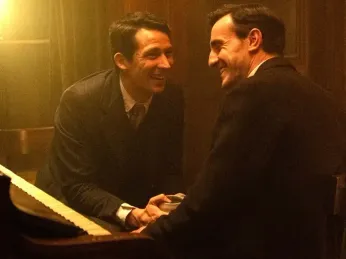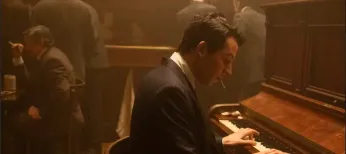
Sep 23
‘The History of Sound’ – Despite the music, this forbidden love tale’s a bit bland
Brian Bromberger READ TIME: 1 MIN.
What if your greatest love was your first one and any chance of happiness disappeared when it ended? That’s the haunting idea behind the new gay film romance, “The History of Sound.” Seemingly a love story, this movie is really about regret, which explains the plaintive melancholic tone reflected as well in the music and soundtrack. The film stars two of the screen’s current It-Boy heartthrobs, Paul Mescal and Josh O’Connor, each presumably straight, but each has had big success in gay roles, such as “All of Us Strangers” and “God’s Own Country.”
The film has gay South African director Oliver Hermanus (“Beauty”) at its helm, so if you think this is going to be a smoldering sexy affair, you would be mistaken. Restraint, not bold passion, is the watchword here, which hints at some of the film’s drawbacks. The main character’s life is marked by depression and grief almost resulting in the cliché of the sad, lonely older gay man.
Voices carry
Voice-over narration is by Chris Cooper as the aged version of Lionel Worthing (Mescal), a musical singing prodigy and farmer’s son from Kentucky. He suffers from synesthesia whereby when hearing music one can also feel and taste it, as well as see colors. He attends the New England Conservatory of Music in 1917. One night at a bar, Lionel hears fellow student David White (O’Connor) at a piano singing a traditional Appalachian song, “Across the Rocky Mountain,” which brings back childhood memories for him. White, a wealthy Newport, Rhode Island orphan, initially discounts Lionel until he hears him sing “Silver Dagger” which enchants him.
Music and trading folk songs act as foreplay (“love at first listen” to quote one observer). David invites him home, and after a sultry scene where David spits a stream of water at Lionel’s face, but otherwise lacking any seductive element, they go to bed perfunctorily, commencing an intermittent love affair. The sex is very brief and honestly lacks both passion and warmth.
Throughout the film, audiences might begin to wonder if the two men have any real desire for each other physically, as the love episodes lack any sense of sensual discovery. However, the chemistry between Mescal and O’Connor is palpable outside the bedroom.
The U.S. entry into World War I intervenes when David is drafted, the Conservatory closes and Lionel, unable to serve because of his poor eyesight, returns to run the family farm for his poor widowed mother. Lionel’s final words to David are: “Write. Send chocolate. Don’t die.”
After the war, David, now teaching at a college in Maine, invites Lionel to join him in a university-funded song-gathering trip to record on wax-cylinders folk songs passed along from one generation to another before they are lost forever. These scenes are the heart of the film, where the two protagonists not only fall in love with the music but each other.

In a later flashback scene, there are hints of trouble in paradise where David asks Lionel, “Do you ever worry about this? What we’re doing?” Near the end of the trip, the two men have a disagreement and part more due to David, especially when he rejects Lionel’s offer to work as his assistant at the college.
From then on, the movie focuses almost entirely on Lionel, but lacks vitality due mainly to the absence of the more charismatic O’Connor. He travels to Rome, conducts a men’s church choir and has an affair with a gorgeous young cellist (Alessandro Bedetti), but gets bored.
He becomes a choir master at Oxford, and gets engaged to Clarissa, a wealthy British woman (Emma Canning), but cannot commit to her and insensitively leaves. David is never far from his thoughts.
He seems to be searching for stability in his personal relationships and professionally that remains elusive. He then decides to attempt reconnecting with David, which encompasses the remainder of the film with Cooper, distinctive as always, portraying the elder Lionel.
Written stories, little depth
The film is based on two short stories by Ben Shattuck found in his book, “The History of Sound: Stories.” Shattuck, who is straight, is also the screenwriter, which is one of the film’s chief problems. The written stories are entirely internalized, which is carried over into the film. This move gives the film a stilted quality, in that there’s little for the two men to do, with inner thoughts conveyed very subtly, hence easily missed.
Oddly, almost all the emotions found in the film, especially of joy and sorrow, beauty and pain, occur in the folk songs. Also, both characters, but especially David, are summarily sketched, revealing little depth.
Later in the film we learn what David had been undergoing and what ultimately happens to him, because there was little indication of any dysfunction during their summer sojourn. There’s always been a strong argument against writers adapting their own works as screenplays and “The History of Sound” is evident to support that thesis. A generous description of the film’s pacing as leisurely for some, might be slow spanning decades, for others unused to period dramas.

This film has been compared to the far superior “Brokeback Mountain,” also drawn from a short story and featuring two hot straight romantic leads intertwined in a thwarted gay romance with two doomed lovers. They both express love outside in nature, a pastoral bliss crisscrossing societal obligations and prohibitions, though “Brokeback” is far sexier.
There’s complexity underneath the surface, but it’s too understated so the film seems emotionally disengaged, with too many untold feelings. Viewers have to infer too much about what’s going on romantically. There are suggestions about trauma and class divisions that never materialize.
Any criticism doesn’t apply to the acting, both men are mesmerizing with Mescal stuck in the less dynamic role, yet still manifesting a vulnerable sensitivity. O’Connor is a more powerful cinematic presence, possessed of an almost electrifying magnetism (and the film sags when he’s not on screen), but he has a buzzing on-screen chemistry with Mescal.
It’s a shame they don’t really get to express it romantically. Hermanus’s direction feels subdued and cautious, resulting in a sterile inaccessibility. A daring, racy approach could have been a virtue here. It’s that star-crossed love story which drives the film and keeps it captivating up to a point.
The movie has a staid, almost dour quality to it, yet other times it’s lyrical and heart-wrenching, especially in the musical sequences. While it’s trying to say something meaningful about the sexual repressiveness of its era, it does so in a manner that is too delicate.
Ultimately, this is one of those movies that with a bolder, more emotionally-nuanced script could have been stupendous. The film’s theme of regret applies also to its execution. Consequently, some viewers will relish the movie, while others will be puzzled and disappointed at what might have been. Yet with all its weaknesses, that magic undeniable undefinable aura between Mescal and O’Connor makes the film almost irresistible. But the key word here is almost.
“The History of Sound” (Mubi/Focus Features/Universal Pictures) is now screening at AMC Kabuki 8 theater and Landmark’s Opera Plaza Cinema.
https://mubi.com/en/us/films/the-history-of-sound






